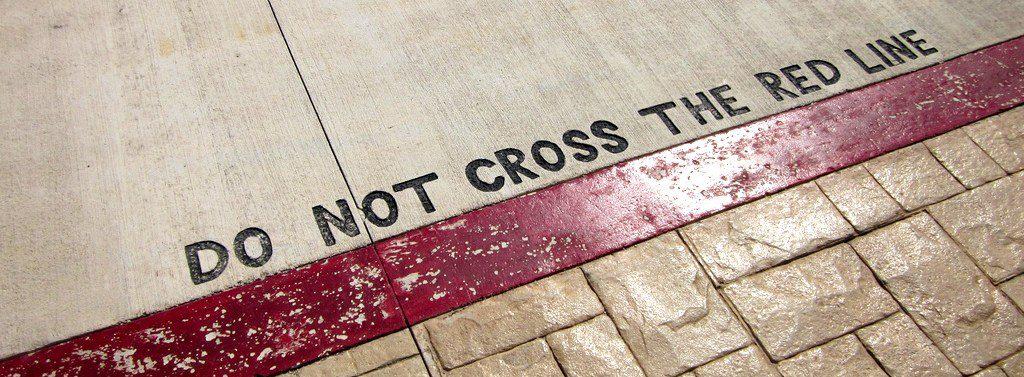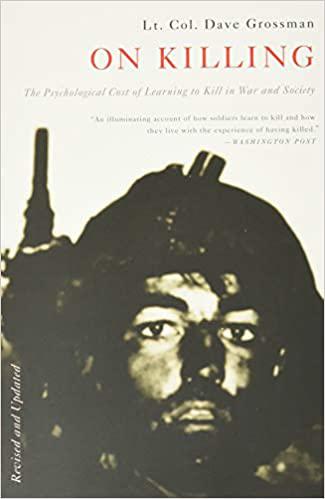Ethics - Tactics, How Low Will You Go?
A look at how to draw the line for oneself in terms of actions and tactics as well as ways to check oneself when getting swept up emotionally in a topic or situation
Why do we ever cross the lines that we set?
We all have our ideas about what we will and won't do, our "red line" that we won't cross:

As a society, at least in theory, we decide on the lines we draw, and set consequences for crossing them. That's why we have laws and punishments for breaking those laws, but further than the laws, our own set of ethics are more personal and in the end, up to us to both define and to live with the consequences of those definitions.
To use a very basic example, the overwhelming majority of us would think that it would be wrong to make a decision to injure or kill someone based on what clothes they were wearing. The idea of doing so is repugnant to us, and seems arbitrary and perhaps barbaric.
However when we are soldiers in a state of war, that may be exactly what determines if someone is "the enemy" and a legitimate and necessary target (yes there are often further rules of engagement that determine if someone is a legitimate target, but essentially my point is that the uniform makes them a target, where otherwise they would not be.) As a soldier defending a position against advancing enemy troops, it isn't going to matter a lot if the enemy soldier you shoot is actively aiming at you, as long as he is advancing on your position, the threat is there.
We do this because we as societies have decided that during war, the restrictions are eased and that things otherwise unthinkable become normal. That doesn't mean that all bets are off, that's why there are war crimes, and also it should be noted that just because society as a whole has decided that wartime acts can happen, doesn't mean that the people committing them don't have to deal with the consequences (PTSD to just name one) so it's pretty clear that at least for a large number of people, the things they do in war that violate their personal ethics deeply bother them later.
There is one last thing that bears mentioning, and that is the soldiers who are not bothered by these acts, who make a career of war and are indifferent to killing. For the most part we view them as necessary in order to protect our society, but we fear them, and many think that they are monsters.
How do we justify these transgressions at the time?
It shouldn't be surprising that it is mentally difficult for people to kill each other in battle, and the subject was studied intensively by the US Army (in addition to many others of course.) On Killing is a well known and worth reading book on the topic, and I feel that a lot of the issues raised within also apply to less extreme ethics transgressions than homicide as well as some of the ways that group think can affect how people involved in gangs/political groups/activist groups will act.

One method used to get people to cross their ethical lines is to dehumanize the enemy. This is time tested, goes back probably about as far as humanity itself. If a group can be convinced that a different group is subhuman, and furthermore dangerous then it becomes much easier to get them to use tactics that they otherwise wouldn't.
Conversely, a common tactic among animal rights activists is to use anthropomorphism and imagery assigning human emotions to animals to elicit an emotionally charged and protective instinct from the targets of their messages. One should note that I am in no way saying that it is necessarily unethical for an animal rights activist to attempt to humanize animals in another person's eyes I am just pointing out a tactic to be examined. Is it more ethical to "humanize" deceptively than to "dehumanize"? Maybe that's a discussion for another time.
Another method is to convince people that they are in a war. By presenting whatever conflict they are involved with as equivalent to war, leaders can ask their followers to do things that they otherwise wouldn't do. People swept up in politically extreme activity are often told that they are in a war, and have their actions compared to heros from past conflicts.
Such comparisons are for the most part hogwash. I would suggest speaking to someone from Yemen, Myanmar, or any of the many places currently experiencing real war before equating one's own actions in peacetime with those of past war heroes.

One more powerful method is to appeal to emotion. Trying to get someone to relate the situation to their personal life is a good way to get them to abandon reason and go with their emotional reaction. Emotions are a good thing, they are responsible for many of the best parts of our lives, but they really have no business when making policy decisions, be they national, local or personal. At those times we really need to be basing those decisions on logic and facts. I have friends who argue that emotion is a powerful tool for spreading awareness, but I have to counter by asking, if you have to resort to using appeals to emotion in order to counter facts, are you really on the right side of the issue?
You own your worst actions for the rest of your life
We don't ever escape our past. Be they ethical lapses or simply mistakes, our minds will bring back our darkest and lowest moments for us to relive, often at the most difficult times.
I speak from experience, and while I will not list off my various ethical failures that still bother me, I will say that while I am an extremely ethical hunter, and the overwhelming majority of times I have gotten clean, quick kills, I have had imperfect shots which required tracking and a follow up shot. While I did nothing unethical on these rare occasions, I will never forget them, I own those mistakes for the rest of my life, and it would be worse were they to have been due to an ethical lapse on my part. The thing that I can do is make sure that my marksmanship is on point, that my equipment is in good shape and that I won't take a questionable shot.
Much like how it is generally accepted among alcoholics and drug addicts there is no such thing as a "former" addict, only one who is not currently using and who wants to stay clean, I feel that one's ethics remain defined by one's worst behavior. That is how low we will go. We may hope to never go there again, and we may work hard to make sure that we do not, but that is what we are capable of and we can't escape that. I am not religious, so I feel that those offering absolution through religion are selling snake oil, but I can no more prove that they are liars than they can prove that they are not. I will say that they are selling an awfully convenient product, one desired by desperate people, with no way to verify that it works, so make of that what you will.
How do we evaluate our tactics?
For someone who is passionate about a topic, and who wants to drive change, how can they stay on the right side of the big red ethical line? This can be especially challenging when involved with a group, where questioning the actions of the group could be considered disloyal, but really it must be done, even if only by asking hard questions of oneself.
It may sound trite, and it's an unpopular opinion these days but I am a big believer in not using tactics that you think would be unethical if used against you. Let's look at the tactic of torture. When it comes to its use as a military and intelligence tactic, we (the United States in this case) aren't supposed to do it, and we think it's a war crime when it is done to our citizens. We don't care if the prisoner is someone who has tortured our soldiers personally it's still wrong to break our code and do that, no matter who it is. Yes soldiers from the US military have committed war crimes often with approval from above, but we as a country condemn such acts.
Let's examine some currently topical scenarios and see where my formula gets us:
Would you be OK with someone who held opposing views physically assaulting you without you posing an immediate danger to them or others? I would not be OK with that. I feel that physical violence (outside of fight sports) is not justified unless it is in defense of oneself or others. For the most part our legal system agrees with that.
Would you be ok with being rounded up and re-educated in a camp? I am an advocate for free speech, so I would not be. If you would not, it's probably best not to suggest that for people who disagree with you politically.
If you were living in a society where your views were unpopular with the majority (say for example being pro-choice in a strongly religious society where abortion is largely condemned) would you be OK with being doxxed? I think doxxing is a danergeous thing to normalize, personally. Something that should surprise no one is that an angry mob is quite poor at delivering justice.
Would you be OK with your workplace being attacked by an angry mob, who then set it on fire with you inside, all because they feel that your employer is immoral? I'm definitely not OK with that, arson is a serious and reckless crime and deserves to be punished severely.
So, what am I trying to say?
I'm not trying to tell anyone what to do, but rather am pointing out that in the end, excuses and the larger situation matter little when one has violated their own principles. If you are OK with doing terrible things to anyone, you are OK with doing terrible things, and need to acknowledge that fact.
